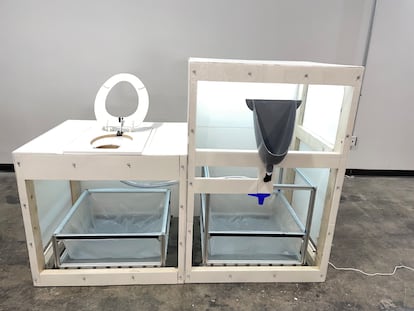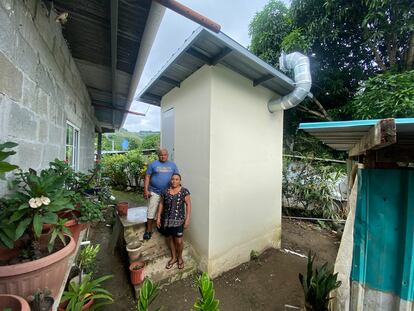Diana Yousef: from NASA consultant to inventor of a toilet that evaporates waste
This toilet – which doesn’t require water or a sewer connection – aims to solve the lack of sanitation, a problem that affects half of the world’s population, especially women and girls

Not many people are capable of getting their interlocutors passionate about a toilet. Diana Yousef is one of the few exceptions. She demonstrates this in every presentation to potential donors or investors, in every interview with the press… and even in a TEDx talk organized at her daughter’s school.
Born in Boston to Egyptian immigrants, Yousef — who holds a PhD in Biochemistry from Cornell University — has developed a toilet that doesn’t require water, nor a connection to any sewage system. It works through a membrane that evaporates between 90% and 95% of waste. The idea tries to solve one of the major problems for half of the world’s population: the lack of sanitation. The consequences that come with this include deaths from infectious diseases, environmental problems and — one that particularly moves Yousef — the violence experienced by women and girls simply for venturing out of their homes to relieve themselves.

“When people live without access to safe sanitation, it’s very difficult for them to improve their quality of life,” Yousef tells EL PAÍS, in a video interview from her home in Boston. According to the World Health Organization, 4.2 billion people use sanitation services that don’t treat waste. Of these, 673 million don’t have any type of toilet and are forced to defecate out in the open. Some 564,000 people die each year from diseases related to poor sanitation, mainly diarrhea.
“But beyond that,” she notes, “one of the things that moves me the most is the disproportionate way in which [a lack of adequate sanitary services] harms women and girls, who don’t have access to safe private toilets near their homes. There’s a huge, little-discussed problem of women being raped — and even murdered — simply because they need to go to the bathroom,” Yousef explains. “50% of schools in the world lack adequate sanitation facilities, which makes it extremely difficult — for girls especially — to go to school. When they go to school, they fight the urge to go to the bathroom, so they don’t eat, they don’t drink, they end up tired, they have trouble paying attention. And, when they start having their period, they miss a week of school every month and fall behind.”
The mother of three daughters — ages 13, eight and five — Yousef laments the situation: “I find it very difficult to understand that this happens to girls all over the world, while my daughters have the life they have just because of where they were born.” Their birth was one of the driving forces that led Yousef to launch her startup — change:WATER Labs — in 2013. “When I had my first daughter, I was out of work for two years, because nobody wanted [to hire] me.” As a result, she had to reinvent herself. “I want to set an example for them, to show them that they can do whatever they want, that they have the ability to decide.” Her Egyptian roots also play a role in her work. “I think that all of us who come from the Middle East are very aware of the importance of water. It’s vital.”

She took up an idea that had emerged during her participation as a consultant on a joint initiative between NASA and the United States Agency for International Development (USAID) in 2009, which sought to find technological solutions to problems related to water access. During this project, the use of breathable materials to recycle waste water and turn it into drinkable water was considered. “These materials have the property of absorbing moisture from one area and passing it into the dry air on the other side. The liquid water enters the material and comes out the other side as vapor,” she describes.
Her previous work with the UN — which involved searching for business models that link the private sector to the field of development — allowed her to visit countries in the Global South and learn about problems with sanitation infrastructure. The breathable material seemed like a very low-energy solution that could be used both on a small and large-scale. It could be very useful in poor communities lacking in infrastructure. “I realized that it was probably better to use [this method] to get rid of dirty water, rather than to make clean water.”
Yousef made the first presentations of her own project at MIT, which allowed her to meet researchers interested in the idea. Some joined her team, which currently has seven people. Thanks to an initial grant of $50,000, she was able to access a laboratory where she could make the idea reality. In February of 2020, the first pilot project was carried out on the ground in a refugee host community in Kiboga, Uganda, with funding from Humanitarian Grand Challenges, an international governmental initiative. The two Turkish-style toilets installed (on the floor, without a seat) served about 400 users per week in a women’s hospital and a girls’ school. “We saw that they contained the waste completely, in a hygienic way. We didn’t detect any smell in the [bathroom]. Additionally, maintenance only needed to be done once every two or three weeks.”
The next pilot project is being carried out in Kuna Naga, an informal suburb of Panama City inhabited by the Indigenous Kuna people, which lacks running water and sewage. Funding is provided by Asocsa, a local construction company that usually works in low-income communities. In October of 2023, two Western-style, sit-down toilets were installed in two homes, with about 25 users in total. There’s no flush system: the membrane simply begins to evaporate water from urine and feces when it comes into contact with it. “We’ve been able to show that we can run these toilets for two, even three months, without having to empty them.” The next planned phase is to install public toilets in the same community.
Yousef estimates that the final price of the iThrone — which, in May of this year, won the MAPFRE Foundation Award for Social Innovation, in the category of Health Improvement and Digital Technology — will be around $200 per unit. “We plan to outsource production to local partners, so the price will come down even further. Other solutions that are used cost tens of thousands of dollars. This is much cheaper and simpler, because it doesn’t require a lot of infrastructure, but it offers high performance by making the waste disappear on-site,” she explains.
Both the bag — made of breathable material — and the waste that doesn’t evaporate are, for the most part, compostable, Yousef adds. So, when emptying the toilet, the waste “can be disposed of in whatever way the partner [organization deems fit]. If it’s a humanitarian organization [operating] in a crisis, or a refugee camp — without the capacity to build adequate sanitation infrastructure — they just burn the waste. But in a community that wants to make sanitation circular, the waste can be converted into something with value, [such as] fuel or fertilizer.”
Tu suscripción se está usando en otro dispositivo
¿Quieres añadir otro usuario a tu suscripción?
Si continúas leyendo en este dispositivo, no se podrá leer en el otro.
FlechaTu suscripción se está usando en otro dispositivo y solo puedes acceder a EL PAÍS desde un dispositivo a la vez.
Si quieres compartir tu cuenta, cambia tu suscripción a la modalidad Premium, así podrás añadir otro usuario. Cada uno accederá con su propia cuenta de email, lo que os permitirá personalizar vuestra experiencia en EL PAÍS.
¿Tienes una suscripción de empresa? Accede aquí para contratar más cuentas.
En el caso de no saber quién está usando tu cuenta, te recomendamos cambiar tu contraseña aquí.
Si decides continuar compartiendo tu cuenta, este mensaje se mostrará en tu dispositivo y en el de la otra persona que está usando tu cuenta de forma indefinida, afectando a tu experiencia de lectura. Puedes consultar aquí los términos y condiciones de la suscripción digital.









































